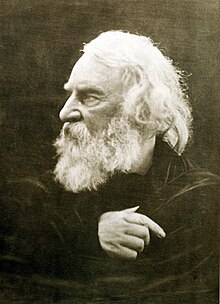Henry Wadsworth Longfellow
| Henry Wadsworth Longfellow | |
|---|---|

Henry Wadsworth Longfellow photographed by Julia Margaret Cameron in 1868
|
|
| Born |
February 27, 1807 Portland, Maine, U.S. |
| Died | March 24, 1882 (aged 75) Cambridge, Massachusetts, U.S. |
| Occupation | Poet Professor |
| Alma mater | Bowdoin College |
| Spouses | Mary Storer Potter Frances Elizabeth Appleton |
| Children | Charles Appleton Longfellow Ernest Wadsworth Longfellow Fanny Longfellow Alice Mary Longfellow Edith Longfellow Anne Allegra Longfellow |
|
|
|
| Signature | |
Henry Wadsworth Longfellow (February 27, 1807 – March 24, 1882) was an American poet and educator whose works include "Paul Revere's Ride", The Song of Hiawatha, and Evangeline. He was also the first American to translate Dante Alighieri's Divine Comedy, and was one of the five Fireside Poets.
Longfellow was born in Portland, Maine, which was then a part of Massachusetts. He studied at Bowdoin College. After spending time in Europe he became a professor at Bowdoin and, later, at Harvard College. His first major poetry collections were Voices of the Night (1839) and Ballads and Other Poems (1841). Longfellow retired from teaching in 1854, to focus on his writing, living the remainder of his life in Cambridge, Massachusetts, in a former Revolutionary War headquarters of George Washington. His first wife Mary Potter died in 1835, after a miscarriage. His second wife Frances Appleton died in 1861, after sustaining burns when her dress caught fire. After her death, Longfellow had difficulty writing poetry for a time and focused on translating works from foreign languages. He died in 1882.
Longfellow wrote many lyric poems known for their musicality and often presenting stories of mythology and legend. He became the most popular American poet of his day and also had success overseas. He has been criticized, however, for imitating European styles and writing specifically for the masses.
Longfellow was born on February 27, 1807, to Stephen Longfellow and Zilpah (Wadsworth) Longfellow in Portland, Maine, then a district of Massachusetts, and he grew up in what is now known as the Wadsworth-Longfellow House. His father was a lawyer, and his maternal grandfather, Peleg Wadsworth, was a general in the American Revolutionary War and a Member of Congress. He was named after his mother's brother Henry Wadsworth, a Navy lieutenant who had died three years earlier at the Battle of Tripoli. Longfellow was the second of eight children; his siblings were Stephen (1805), Elizabeth (1808), Anne (1810), Alexander (1814), Mary (1816), Ellen (1818) and Samuel (1819). Longfellow was of entirely English ancestry, all of which had been in New England since the early 1600s.
...
Wikipedia
